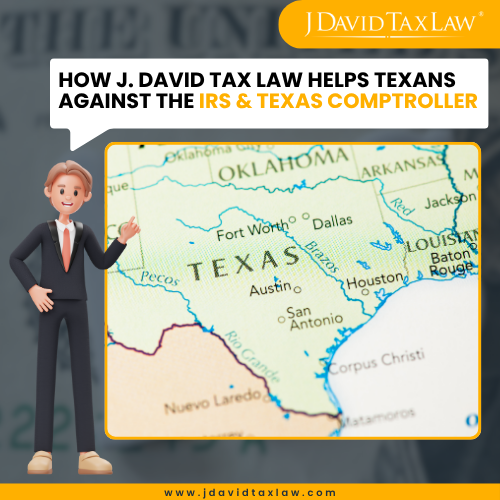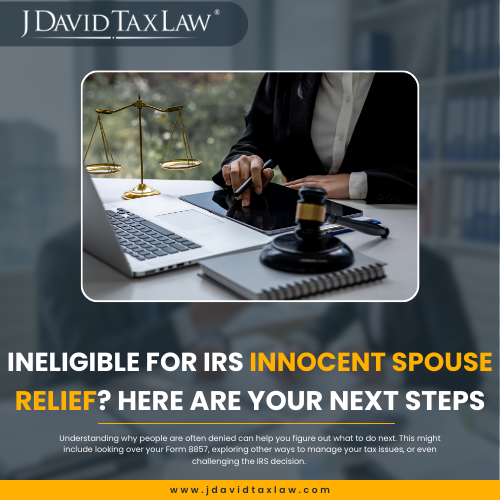When Texans fall behind on taxes, many assume it’s only the IRS they need to worry about. But for businesses and individuals alike, tax debt owed to the Texas Comptroller can be just as serious, if not more aggressive, in its enforcement. From franchise tax assessments to state audits and penalties, Texas tax authorities operate on an entirely different legal track than the federal government.
That’s why
choosing a tax law firm with deep knowledge of both systems is essential.
At J. David Tax Law, we don’t just handle IRS debt, we specialize in the complex and often misunderstood world of state tax enforcement. Our legal team is well-versed in the nuances of Texas law, helping clients resolve both IRS disputes and state tax obligations with clarity, speed, and strategic precision.
This article will walk you through the key differences between federal and Texas state tax enforcement, outline the state-specific legal risks that national firms often overlook, and explain
how
J. David Tax Law
is uniquely positioned to protect Texans facing tax debt,
wherever it originates.
Texas Franchise Tax vs. IRS Debt, What’s the Difference?
Many Texans are surprised to learn that the
Texas Comptroller of Public Accounts enforces tax debt very differently from the IRS
. While both entities have the power to collect
unpaid taxes
, their legal procedures, timelines, and consequences vary in key ways, and misunderstanding those differences can cost you.
IRS Debt
The Internal Revenue Service (IRS) handles tax collection at the federal level. It typically allows multiple notices, structured appeal rights, and offers programs like:
Although serious, IRS enforcement often includes more formal due process before aggressive action is taken. That means taxpayers usually have time to respond, negotiate, and seek legal representation.
Texas Franchise Tax
The
Texas franchise tax
, by contrast, is
enforced at the state level by the Texas Comptroller
and applies primarily to businesses. But enforcement is often quicker, less forgiving, and more disruptive:
State liens can be filed with little notice.
A business can be forfeited or dissolved for noncompliance.
The Comptroller may deny registration renewals or suspend licenses.
There’s no offer-in-compromise equivalent or hardship relief similar to federal options.
In many cases, the state expects immediate payment or full compliance before discussing resolution, leaving businesses vulnerable to shutdowns or public notices of delinquency.
State-Specific Legal Risks Texans Should Know
While IRS debt can certainly disrupt your finances, state tax debt in Texas often comes with sharper, faster consequences, especially for business owners. The Texas Comptroller enforces franchise and sales tax obligations with its own legal tools, and these can trigger serious outcomes without the same warning or negotiation structure found at the federal level.
1. Liens Filed Quickly and Publicly
The Texas Comptroller can file a
state tax lien
against your business or personal assets far more swiftly than the IRS. These liens become part of the public record and can damage your credit, restrict your ability to borrow, and create reputational issues for your company.
2. Business License Revocation or Forfeiture
Unpaid franchise tax can lead to administrative forfeiture of your company’s legal status. This means your business is no longer in good standing with the state, jeopardizing contracts, legal protections, and the right to operate.
3. Personal Liability for Officers and Owners
In some cases, especially for sales tax, the state can pursue personal liability against company officers or responsible parties. This is a major risk that many national firms miss because it’s state-specific and tied closely to Texas enforcement laws.
4. Criminal Penalties
Texas tax law allows for criminal charges in cases involving tax fraud, evasion, or failure to remit collected taxes like sales tax. These aren’t just civil issues, they can carry real jail time if left unresolved.
5. Fewer Formal Settlement Programs
Unlike the IRS, Texas doesn’t offer programs like offer in compromise or
hardship-based CNC
. Resolution options are more limited, and negotiations often depend on direct, experienced legal representation.
Why Other National Firms Often Mishandle State Tax Issues
When it comes to resolving tax debt, many Texans turn to large national firms promising fast relief from the IRS. But here’s the problem: most of these firms focus almost exclusively on federal tax cases and lack the legal expertise to handle the complexities of state tax enforcement, especially in a state as unique as Texas.
One-size-fits-all solutions don’t work at the state level
Other national firms often apply IRS strategies to every case, regardless of whether it involves the Texas Comptroller or another state agency. This can lead to:
Missed deadlines
Inappropriate resolution attempts
Increased legal exposure for business owners
What works with the IRS, like installment plans, offers in compromise, or hardship relief, often doesn’t exist in Texas. Attempting to negotiate state debt the same way as federal debt can make a bad situation worse.
Lack of familiarity with Texas enforcement practices
Texas has its own tax code, administrative procedures, and enforcement systems. National firms unfamiliar with
Texas
lien timelines
, sales tax trust fund recovery rules, business forfeiture procedures,
may overlook critical options or fail to respond in time, putting taxpayers at greater risk of aggressive action by the state.
How J. David Tax Law Strategically Handles Both IRS and Texas Tax Debt
Unlike many firms that narrowly focus on the IRS, J. David Tax Law provides legal strategies tailored to the distinct procedures of both federal and Texas tax enforcement.
Our approach is rooted in jurisdiction-specific expertise
—because what works for the IRS doesn’t always work for the Texas Comptroller.
IRS Tax Debt Solutions
For clients facing IRS debt, we offer comprehensive legal representation in:
Offers in Compromise (OIC)
:
We evaluate financial hardship to settle IRS debt for less than what’s owed when qualified.
Installment agreements
:
We negotiate structured payment plans based on income and allowable expenses.
Currently Not Collectible
(CNC) status
: For taxpayers in hardship, we can pause enforcement activity while preserving rights.
Penalty abatement
:
Where applicable, we work to reduce or eliminate penalties through legal justification and administrative relief.
These programs require extensive legal documentation, financial disclosures, and experience in IRS procedure, something our attorneys are trained to navigate from day one.
Texas Comptroller Tax Strategies
Texas doesn’t offer OIC or CNC, but that doesn’t mean resolution isn’t possible. We handle:
Voluntary disclosure agreements:
For businesses or individuals with unreported liabilities, we can help reduce penalties and avoid criminal exposure.Sales and franchise tax audit defense:
We engage directly with auditors, analyze findings, and respond with supporting documentation to reduce or eliminate proposed assessments.Appeals and administrative hearings:
We file protests and represent clients before the Texas Comptroller’s administrative law system.Resolution negotiations:
We work directly with state tax authorities to develop payment arrangements and protect business status, even when full payment isn’t immediately possible.
Comprehensive Tax Solutions Across Jurisdictions
Our strength lies in our ability to navigate both federal and Texas state systems simultaneously. Many clients come to us with issues in both areas, where federal inaction worsens state enforcement or vice versa
. J. David Tax Law builds coordinated strategies
that protect clients from compounding consequences across jurisdictions.
Personalized Representation
Every tax problem is different. That’s why we never rely on automated forms or scripted customer service reps. Your case is handled by a real tax attorney who builds a custom strategy based on the specific laws, enforcement risk, and financial realities of your case.
This personalized,
dual-jurisdiction approach is what sets us apart
, and why Texans trust us when either the IRS or the Texas Comptroller come knocking.
Resources & Authorities for Texas Taxpayers
Texans facing tax debt—whether from the IRS or the Texas Comptroller—deserve accurate, up-to-date information to make informed decisions. Below are official resources that provide deeper insight into your rights, responsibilities, and legal options when dealing with tax enforcement at both the state and federal level.
The Texas Comptroller of Public Accounts is the primary authority for enforcing state tax laws, including franchise tax, sales tax, and other business-related levies. Their Franchise Tax page outlines reporting requirements, due dates, and enforcement actions for businesses operating in Texas.
For individuals and businesses seeking to understand their rights when interacting with the state, the Texas Taxpayer Bill of Rights details important protections and appeal processes available under Texas law.
When combined with experienced legal guidance, these resources can help Texans take proactive steps to protect their finances and business operations. But in most cases, success depends on having the right advocate—one who understands both IRS procedures and Texas-specific enforcement risks.
Why Texans Trust J. David Tax Law
Clients across
Dallas
,
Houston
,
Austin
, and
San Antonio
trust us because we don’t offer one-size-fits-all promises. Instead, we deliver personalized legal representation designed to:
Stop aggressive collection actions
Minimize financial exposure
Restore business standing
Prevent criminal referrals or personal liability
We’re proud to be a local law firm in Texas, not a call center. Our attorneys engage directly with clients and tax authorities, guiding you every step of the way with clarity and urgency.
Get Legal Help for IRS or Texas Comptroller Tax Debt Today
If you’re facing tax debt in Texas, whether from the IRS or the Texas Comptroller, now is the time to act. The consequences of inaction can include liens, license suspensions, forfeitures, and even personal liability. But with the right legal team, these risks can be managed and resolved.
Contact us today
for a confidential consultation with an experienced tax attorney. We’ll review your case, explain your options, and develop a tailored legal strategy to protect your income, assets, and business.





















